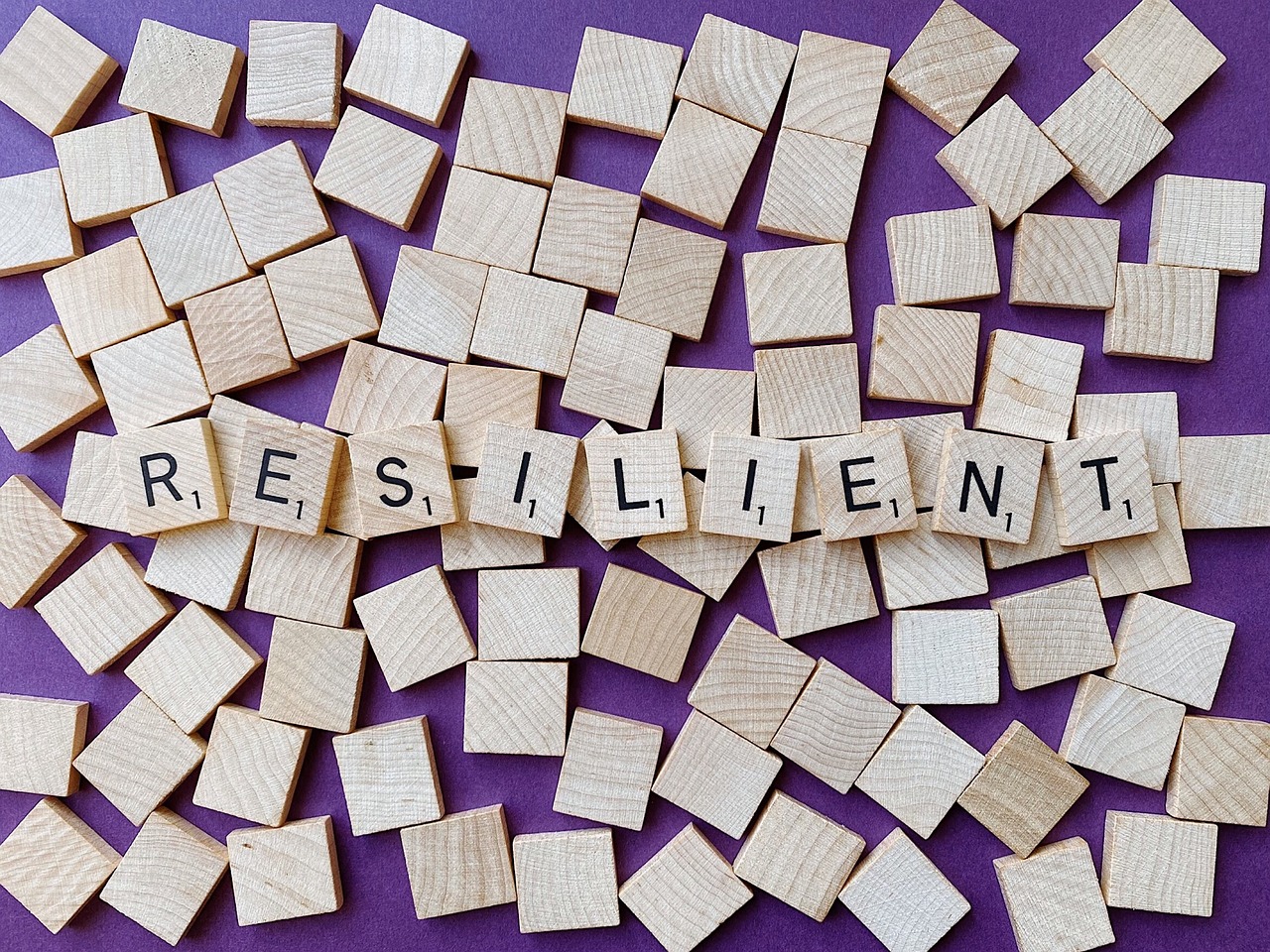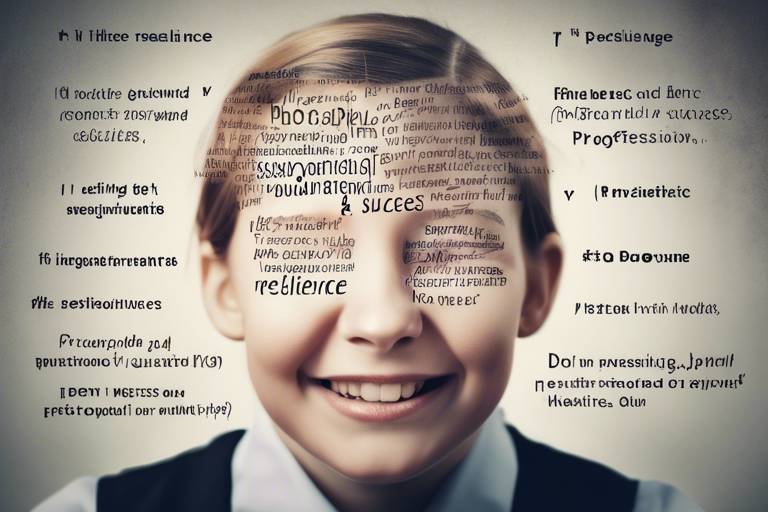Cultivating Resilience in Teens – Navigating Life's Challenges
In today's fast-paced world, cultivating resilience in teenagers is more crucial than ever. As they navigate the tumultuous waters of adolescence, they encounter a myriad of challenges that can test their emotional strength and adaptability. Resilience is not just a buzzword; it’s a vital skill that empowers teens to bounce back from setbacks, learn from their experiences, and grow into well-rounded adults. Imagine resilience as a sturdy tree that bends with the wind but never breaks, allowing it to thrive even in harsh conditions. By nurturing this quality, we equip our teens with the tools they need to face life's inevitable ups and downs.
Understanding why resilience is vital for teenagers can significantly impact their ability to face adversity. During these formative years, teens are developing their identities and coping mechanisms. Resilience acts as a buffer against stress, anxiety, and depression, which are all too common in today’s youth. Studies have shown that resilient teens are more likely to achieve their goals, maintain healthy relationships, and exhibit greater emotional well-being. In essence, resilience is like a safety net that catches them when they fall, allowing them to get back up and try again with newfound strength.
Teens encounter various challenges that can shake their confidence and emotional stability. From academic pressures to social dynamics, the hurdles they face require a strong foundation of resilience to overcome. It’s essential to recognize these challenges and understand how they can impact a teen's mental health. For instance, the pressure to excel academically can create a whirlwind of stress, while navigating social relationships can feel like walking through a minefield. By identifying these obstacles, we can better support our teens in developing the resilience they need to thrive.
The pressure to excel academically can be overwhelming for teens. The competition to get into good colleges, coupled with the expectations from parents and teachers, can create a perfect storm of anxiety. Many teens find themselves caught in a cycle of stress, leading to burnout and mental health issues. Resilience plays a crucial role here; it helps them manage stress effectively and view challenges as opportunities for growth rather than insurmountable obstacles. Imagine resilience as a muscle that gets stronger with each challenge faced, enabling teens to lift heavier burdens as they progress through their educational journeys.
Finding a balance between academic responsibilities and extracurricular activities is crucial for maintaining mental health. Teens often feel the need to excel in every area of their lives, which can lead to overwhelming schedules and burnout. To help them manage their time effectively, it’s essential to encourage prioritization and self-care. Here are some strategies:
- Set realistic goals and expectations.
- Encourage breaks and downtime to recharge.
- Help them create a balanced schedule that allows for both work and play.
By teaching them to manage their time wisely, we empower them to maintain their well-being while pursuing their passions.
Failure is a part of life, yet many teens struggle with it. The fear of failure can be paralyzing, leading to avoidance behaviors and a lack of motivation. However, resilience can help them learn from setbacks and develop a growth mindset. When teens understand that failure is not a reflection of their worth but rather a stepping stone to success, they become more willing to take risks and try again. It’s like learning to ride a bike; each fall teaches them something new, and with practice, they eventually find their balance.
Social dynamics, including peer pressure and bullying, can significantly impact a teen's self-esteem. The need for acceptance can lead them to make choices that don’t align with their values. Resilience plays a vital role in helping teens navigate these social landscapes. By fostering a strong sense of self and encouraging them to surround themselves with supportive friends, we can help them stand firm against negative influences. Just like a strong fortress, resilient teens can withstand the storms of peer pressure and emerge even stronger.
Developing resilience is a skill that can be taught and nurtured. Parents and educators play a crucial role in this process by providing practical strategies and activities that foster resilience in teens. It's not just about telling them to be strong; it's about equipping them with the tools to handle life's challenges with grace and confidence.
Practicing mindfulness can significantly enhance emotional regulation in teens. Techniques such as deep breathing, meditation, and journaling can help them stay grounded and manage their emotions effectively during stressful situations. By incorporating mindfulness practices into their daily routines, teens can learn to pause, reflect, and respond to challenges with clarity rather than react impulsively. Think of mindfulness as a mental reset button, allowing them to approach problems with a fresh perspective.
Having a support system is crucial for resilience. Positive relationships with family, friends, and mentors provide a safety net during tough times. Encouraging teens to nurture these connections can significantly enhance their ability to cope with challenges. Whether it’s through open communication, shared activities, or simply being there for one another, these relationships create a foundation of support that helps teens feel valued and understood. Just like a well-tended garden, positive relationships can flourish and provide nourishment during difficult times.
1. What is resilience, and why is it important for teens?
Resilience is the ability to bounce back from setbacks and adapt to challenges. For teens, developing resilience is crucial as it helps them cope with the pressures of adolescence, leading to better emotional health and academic success.
2. How can parents help their teens build resilience?
Parents can help by encouraging open communication, modeling resilient behavior, and providing opportunities for teens to face challenges in a supportive environment.
3. Are there specific activities that can foster resilience in teens?
Yes! Activities like team sports, volunteering, and mindfulness practices can all contribute to building resilience by teaching teens teamwork, empathy, and emotional regulation.
4. What role does failure play in developing resilience?
Failure is a natural part of life and an essential component of learning. By helping teens view failure as an opportunity for growth, they can develop a stronger sense of resilience and a growth mindset.

The Importance of Resilience
Understanding why resilience is vital for teenagers can empower them to face adversity. Resilience isn’t just a buzzword; it’s a crucial life skill that helps teens bounce back from setbacks, adapt to change, and keep moving forward despite challenges. Think of resilience as a mental muscle—the more you work it out, the stronger it gets! This ability to recover from difficulties is not only essential during the tumultuous teenage years but also lays the groundwork for a successful adulthood.
Psychologically, resilience offers numerous benefits. It helps teens develop a positive outlook on life, enhancing their overall mental health. When faced with challenges, resilient teens are more likely to view obstacles as opportunities for growth rather than insurmountable barriers. This shift in perspective can lead to increased motivation and a greater sense of control over their lives. Research shows that resilient individuals tend to experience lower levels of stress and anxiety, which is crucial during an age when mental health issues are on the rise.
Moreover, resilience fosters long-term impacts that extend beyond adolescence. Teens who cultivate this skill are better equipped to handle the pressures of adulthood, whether it’s managing a career, navigating relationships, or dealing with unexpected life events. They learn to embrace change, adapt to new situations, and maintain a sense of purpose, even when the going gets tough. In essence, resilience is like a life jacket that keeps them afloat amidst the turbulent waters of life.
To illustrate the importance of resilience, consider this: imagine a rubber band. When you stretch it, it adapts to the new shape but always returns to its original form. This is what resilience does for teens—it allows them to stretch their limits, learn from experiences, and return to a state of equilibrium. So, how can we ensure that our teens develop this invaluable skill? By providing them with the right tools and support, we can help them build resilience that lasts a lifetime.
In summary, resilience is not merely a trait that some people have and others don’t; it is a skill that can be developed and nurtured. By understanding its importance, we can create an environment that fosters resilience in our teens, equipping them to handle life’s challenges with confidence and grace.
- What is resilience? Resilience is the ability to recover from setbacks, adapt to change, and keep going in the face of adversity.
- Why is resilience important for teens? Resilience helps teens manage stress, cope with challenges, and develop a positive outlook on life.
- Can resilience be taught? Yes, resilience can be developed through various strategies and support systems.
- What are some ways to build resilience in teens? Techniques include practicing mindfulness, encouraging positive relationships, and promoting a growth mindset.

Identifying Challenges Teens Face
Adolescence is a whirlwind of change, and it's no surprise that teens face a multitude of challenges during this tumultuous period. From the pressure to excel academically to the complexities of social dynamics, these hurdles can feel like a mountain to climb. Understanding these challenges is the first step in helping teens build the resilience they need to overcome them. It’s like equipping them with a toolkit for life, ready to tackle whatever comes their way!
One of the primary challenges that teens encounter is academic pressure. The expectation to achieve high grades and secure a spot in a prestigious college can be overwhelming. This pressure often leads to stress and anxiety, making it difficult for them to focus on their studies. In fact, a recent survey revealed that over 60% of high school students reported feeling stressed about their academic performance. It's crucial for teens to learn how to manage this pressure effectively, and that’s where resilience comes into play.
Another significant challenge is finding a balance between school and extracurricular activities. Many teens are involved in sports, clubs, and part-time jobs, which can lead to a packed schedule. Juggling these responsibilities often leaves little room for downtime, leading to burnout. To help teens navigate this, it’s essential to teach them time management skills. By prioritizing tasks and setting realistic goals, they can learn to manage their time better, ensuring they have time for both their responsibilities and relaxation.
Then there’s the inevitable experience of failure. Whether it’s a poor grade on a test or not making the team, failure is a part of life that every teen will face. Unfortunately, many teens struggle to cope with these setbacks. They may view failure as a reflection of their worth, leading to feelings of inadequacy. By fostering a growth mindset, parents and educators can help teens understand that failure is not the end but rather a stepping stone to success. Resilience plays a vital role here, allowing them to learn from their mistakes and bounce back stronger.
Social challenges are another area where resilience is crucial. The teenage years are often marked by intense social dynamics, including peer pressure and bullying. Navigating friendships can be tricky, and the fear of exclusion can lead to anxiety and low self-esteem. Teens may feel pressured to conform to certain behaviors or appearances to fit in, which can be detrimental to their mental health. Building resilience helps them develop a strong sense of self and the ability to stand firm in their values, even when faced with peer pressure.
In conclusion, the challenges that teens face are diverse and multifaceted. By identifying these obstacles, we can better equip them with the skills they need to navigate this challenging time. Resilience is not just about bouncing back; it’s about growing stronger with each challenge faced. As we support our teens in developing this crucial skill, we empower them to face life’s ups and downs with confidence and courage.
- What is resilience, and why is it important for teens?
Resilience is the ability to adapt and recover from challenges. For teens, developing resilience is crucial as it helps them cope with stress, build self-esteem, and face life's difficulties head-on. - How can parents help their teens build resilience?
Parents can foster resilience by encouraging open communication, teaching problem-solving skills, and modeling a positive attitude toward challenges and failures. - Are there specific activities that can help improve resilience in teens?
Yes! Activities such as mindfulness practices, team sports, and volunteering can enhance resilience by providing teens with coping strategies and opportunities to build supportive relationships.

Academic Pressures
The pressure to excel academically can feel like a heavy weight on the shoulders of many teenagers. With the increasing competition in schools, the expectations from parents, and the desire to secure a bright future, teens often find themselves caught in a whirlwind of stress. It's not just about getting good grades; it’s about maintaining a certain image, being involved in extracurricular activities, and preparing for college admissions. This overwhelming pressure can lead to anxiety, depression, and a host of mental health issues, making it crucial for teens to develop resilience to cope with these challenges.
Imagine being in a race where everyone is sprinting ahead, and you’re trying to keep up while juggling books, assignments, and social life. It’s exhausting! This scenario is all too familiar for many teens today. The fear of failure can loom large, making them feel like they’re walking on a tightrope. Resilience plays a pivotal role in helping them navigate this treacherous path. By building resilience, teens can learn to manage stress effectively, bounce back from setbacks, and ultimately view challenges as opportunities for growth.
To further illustrate the impact of academic pressures, let’s consider some of the common stressors that teens face:
- High Expectations: Whether from parents, teachers, or themselves, the pressure to achieve high grades can be daunting.
- Standardized Testing: The emphasis on test scores can create anxiety and a fear of not meeting benchmarks.
- College Admissions: The race to get into prestigious colleges adds another layer of stress, often leading to unhealthy competition among peers.
It's essential for teens to recognize that while academic success is important, it should not come at the cost of their mental health. Resilience allows them to view failures as stepping stones rather than roadblocks. For instance, when faced with a poor test score, a resilient teen might analyze what went wrong, seek help, and adjust their study habits rather than succumbing to feelings of inadequacy.
Moreover, fostering resilience can also involve practical strategies. For example, teens can benefit from time management skills that help them balance their academic responsibilities with leisure activities. Establishing a study schedule, setting realistic goals, and taking regular breaks can significantly reduce stress levels. By learning to prioritize and manage their time effectively, teens can create a healthier relationship with their studies, leading to improved performance and well-being.
In conclusion, while academic pressures are a reality for many teens, developing resilience is a powerful tool that can help them navigate these challenges. By embracing a growth mindset and implementing effective strategies, they can transform stress into strength, ensuring that they not only survive but thrive during their formative years.
- What are some signs that a teen is struggling with academic pressure? Look for signs such as changes in mood, withdrawal from social activities, declining grades, or expressions of anxiety about school.
- How can parents help their teens manage academic pressure? Open communication is key. Encourage your teen to express their feelings, and help them set realistic goals while providing support and understanding.
- Are there specific resilience-building activities for teens? Yes! Activities like mindfulness exercises, journaling, and engaging in sports can help build resilience.

Balancing School and Extracurriculars
Finding the right balance between schoolwork and extracurricular activities can feel like juggling flaming torches while riding a unicycle. It’s a challenge that many teens face, and it’s crucial for their overall well-being and development. With academic demands on one side and the allure of sports, clubs, and hobbies on the other, teens often find themselves stretched thin. The key to managing this balancing act lies in effective time management and prioritization.
First and foremost, it’s essential for teens to recognize their limits. Overcommitting can lead to burnout, which is like running a marathon without training—exhausting and counterproductive. Encouraging teens to take a step back and evaluate their commitments can help them make informed decisions about what to keep and what to let go. They should ask themselves questions like:
- What activities bring me joy and fulfillment?
- Which commitments align with my long-term goals?
- Am I feeling overwhelmed, and how can I adjust my schedule?
Once they have a clearer picture, it’s time to create a structured schedule. Using tools like planners or digital calendars can be a game changer. By mapping out their week, teens can allocate time for homework, study sessions, and extracurriculars, ensuring that nothing falls through the cracks. For instance, setting aside specific blocks of time for studying can help them stay focused and productive, while also leaving room for leisure activities that recharge their batteries.
Moreover, fostering open communication with parents and educators can provide additional support. When teens express their struggles with balancing responsibilities, adults can offer guidance and help them find solutions. This collaborative approach not only strengthens relationships but also empowers teens to take ownership of their choices. It’s like having a safety net while they navigate the circus of life.
Ultimately, the goal is to cultivate a sense of adaptability. Life is unpredictable, and sometimes plans need to change. Teaching teens to be flexible and resilient in the face of unexpected challenges will serve them well, both in school and beyond. They’ll learn that it’s okay to adjust their commitments when necessary, allowing them to maintain a healthy balance without sacrificing their mental health.
In conclusion, balancing school and extracurricular activities is not just about managing time; it’s about prioritizing well-being and personal growth. By recognizing their limits, structuring their schedules, and fostering open communication, teens can navigate this challenging phase of life with confidence and ease.
1. How can I help my teen prioritize their activities?
Encourage them to list their commitments and evaluate which ones they enjoy and which align with their future goals. This reflection can help them make informed choices.
2. What are some effective time management techniques for teens?
Using planners, setting specific study times, and breaking tasks into smaller, manageable chunks can significantly enhance productivity.
3. How can I support my teen if they feel overwhelmed?
Engage in open conversations about their feelings, offer to help them reorganize their schedule, and remind them that it's okay to take breaks and ask for help.

Dealing with Failure
Failure is an inevitable part of life, especially during the tumultuous teenage years. For many teens, encountering setbacks can feel like the end of the world. They might think, "Why does this always happen to me?" or "I must not be good enough." However, it’s crucial to understand that failure is not a reflection of their worth or potential; instead, it’s a stepping stone toward growth and resilience. The key lies in how they respond to these setbacks. By developing a healthy perspective on failure, teens can learn to embrace it as a natural part of their journey rather than a roadblock.
One of the most important lessons in dealing with failure is recognizing that it often brings valuable insights. When a teen faces a setback, it’s an opportunity to ask questions like:
- What did I learn from this experience?
- How can I approach this differently next time?
- What strengths can I build upon to overcome this challenge?
These questions can help shift the focus from disappointment to a mindset of growth. Instead of viewing failure as a dead end, teens can start to see it as a detour that leads them to new paths and possibilities. This mindset shift is crucial in fostering resilience.
Moreover, encouraging teens to share their experiences with failure can be incredibly beneficial. Whether it’s discussing their struggles with friends, family, or mentors, expressing their feelings can alleviate the burden of isolation. It’s essential for them to know that they are not alone in their experiences. Many successful individuals have faced failures before achieving their goals. For example, renowned figures like J.K. Rowling and Michael Jordan encountered numerous rejections and setbacks before they became icons in their fields. Sharing such stories can inspire teens and help them realize that perseverance is key.
In addition to reframing their thoughts about failure, teens can also develop practical strategies to cope with it. Here are a few methods that can help:
- Set realistic goals: Encourage teens to set achievable goals that allow room for mistakes and learning.
- Practice self-compassion: Teach them to treat themselves with kindness and understanding when they fail, rather than harsh self-criticism.
- Focus on the process: Emphasize the importance of the journey rather than just the outcome. Celebrate efforts and progress, no matter how small.
By incorporating these strategies into their lives, teens can cultivate a more resilient mindset that prepares them to face future challenges head-on. Remember, resilience is not about avoiding failure but learning to rise stronger after each fall. It’s about transforming setbacks into comebacks and using them as fuel for personal growth.
Q: How can I help my teen cope with failure?
A: Encourage open discussions about their feelings and experiences. Share stories of successful people who faced failures, and practice self-compassion techniques together.
Q: Is failure always negative?
A: Not at all! Failure can provide valuable lessons and opportunities for growth. It’s essential to view it as a stepping stone rather than a stumbling block.
Q: What are some signs that my teen is struggling with failure?
A: Signs may include withdrawal from activities they once enjoyed, changes in mood, increased anxiety, or a lack of motivation. It’s important to communicate and offer support during these times.

Social Challenges
Ah, the teenage years—those rollercoaster rides of emotions, friendships, and social dynamics! For many teens, navigating the intricate web of social relationships can feel like walking a tightrope. One small misstep, and they might plunge into the deep end of peer pressure, bullying, or even isolation. These can greatly impact a teen's self-esteem and overall mental health, making it crucial for them to develop resilience to weather these storms.
Peer pressure is perhaps one of the most daunting challenges teens face today. Imagine being in a room full of friends, and everyone is daring you to try something risky. The pressure to fit in can be overwhelming, often leading to choices that don’t align with a teen's values or desires. This is where resilience comes into play. By cultivating a strong sense of self and the ability to say "no," teens can navigate these pressures more effectively. They learn that true friends respect their decisions, and that it’s okay to stand out rather than blend in.
Another significant social hurdle is bullying. Whether it's verbal taunts, social exclusion, or cyberbullying, the effects can be devastating. Many teens internalize this negativity, leading to feelings of worthlessness. However, resilience equips them with the tools to confront these challenges head-on. By fostering a supportive environment, whether through family or friends, teens can find the strength to rise above bullying. They learn to seek help, communicate their feelings, and understand that they are not alone in their struggles.
Moreover, the rise of social media has added a new layer to social challenges. With the constant comparison to curated online personas, many teens grapple with anxiety and self-doubt. It's easy to forget that behind those perfect pictures, everyone has their own battles. Here, resilience can act as a shield. By encouraging teens to engage mindfully with social media and to focus on their own journey, we can help them build a healthier self-image.
To help teens build resilience against these social challenges, here are some strategies:
- Encourage Open Communication: Create an environment where teens feel safe to express their feelings and experiences without judgment.
- Foster Empathy: Teach teens to understand and respect others' feelings, which can help them navigate their own social dynamics.
- Promote Healthy Friendships: Encourage them to surround themselves with positive influences who uplift rather than bring them down.
In conclusion, while social challenges can be daunting, they are also an integral part of growing up. By fostering resilience, teens can learn to navigate these tumultuous waters with confidence and strength. After all, it’s not just about surviving adolescence; it’s about thriving through it!
- What is resilience? Resilience is the ability to bounce back from difficulties and adapt to challenges effectively.
- How can I help my teen build resilience? Encourage open communication, promote healthy relationships, and teach them coping strategies for stress.
- Why is resilience important for teens? Resilience helps teens handle stress, overcome obstacles, and develop a positive self-image, which is crucial for their overall well-being.

Building Resilience Skills
Building resilience is not just about enduring life's challenges; it's about developing a toolkit of skills that can help teenagers navigate through difficulties with confidence and grace. Resilience can be cultivated through intentional practice and supportive environments, allowing teens to bounce back from adversity and emerge stronger. So, how can we equip our teens with these vital skills? Here are some effective strategies that parents and educators can implement:
First and foremost, mindfulness plays a pivotal role in enhancing emotional regulation. By practicing mindfulness, teens can learn to stay present and grounded, which is essential when faced with stressful situations. Techniques such as deep breathing, meditation, or even simple activities like journaling can help them process their emotions more effectively. For instance, a teen might take a moment to pause and breathe deeply before responding to a challenging situation, allowing them to approach it with a clearer mind.
Additionally, it’s crucial to encourage positive relationships. A strong support system can make all the difference when navigating tough times. Teens should be encouraged to foster friendships that are uplifting, where they feel valued and understood. This support can come from peers, family members, or mentors who provide a safe space for sharing feelings and experiences. Just like a sturdy bridge, these relationships can help teens cross over the turbulent waters of life's challenges.
Moreover, teaching problem-solving skills is essential. When teens encounter obstacles, they should be equipped with the ability to analyze the situation, brainstorm potential solutions, and evaluate the outcomes. This not only promotes independence but also helps them view challenges as opportunities for growth. For example, if a teen is struggling with a difficult subject in school, instead of feeling defeated, they can explore various strategies: seeking help from a teacher, forming a study group, or utilizing online resources.
Another effective method is to promote a growth mindset. Encouraging teens to view failures as learning experiences rather than setbacks can significantly enhance their resilience. By reframing their thoughts around challenges, they can develop a more positive outlook on life. For instance, instead of saying, "I can't do this," they might say, "I can't do this yet." This simple shift in language can empower them to embrace challenges and persist despite difficulties.
Finally, it's essential to instill a sense of self-efficacy in teens. When they believe in their ability to succeed, they are more likely to take on challenges and push through adversity. Parents and educators can help build this belief by celebrating small victories and encouraging teens to set achievable goals. By recognizing their progress, teens can develop confidence in their skills and abilities, reinforcing their resilience.
- What is resilience and why is it important for teens?
Resilience is the ability to bounce back from setbacks and adapt to challenging situations. For teens, developing resilience is crucial as it helps them handle stress, navigate social dynamics, and face academic pressures effectively. - How can mindfulness help in building resilience?
Mindfulness practices, such as meditation and deep breathing, help teens manage their emotions and stay grounded during stressful situations, enhancing their emotional regulation and resilience. - What role do positive relationships play in resilience?
Positive relationships provide support and encouragement, helping teens feel valued and understood. This support system is essential for coping with life's challenges. - How can parents encourage a growth mindset in their teens?
Parents can promote a growth mindset by encouraging teens to view failures as learning experiences, celebrating their efforts, and reinforcing the idea that abilities can be developed through dedication and hard work.

Mindfulness and Emotional Regulation
In today’s fast-paced world, mindfulness has emerged as a powerful tool for enhancing emotional regulation, especially among teenagers. Imagine trying to navigate a stormy sea without a compass; that’s what it feels like for many teens dealing with the tumult of emotions and pressures. Mindfulness serves as that much-needed compass, helping them to anchor themselves amidst the chaos. It’s all about being present in the moment, acknowledging feelings without judgment, and creating a space where they can respond rather than react impulsively.
Practicing mindfulness can significantly improve a teen's ability to manage stress and anxiety. For instance, when faced with a challenging situation—be it an upcoming exam or a conflict with a friend—taking a moment to breathe and center oneself can change the entire experience. This simple act of pausing allows teens to recognize their feelings, understand their triggers, and make conscious choices about how to respond. By integrating mindfulness into their daily routines, teens can cultivate a greater sense of awareness and control over their emotions.
Here are some effective mindfulness techniques that can help teens enhance their emotional regulation:
- Deep Breathing Exercises: Focusing on the breath can ground teens and help them regain composure during stressful moments.
- Body Scan Meditation: This technique encourages them to pay attention to different parts of their body, promoting relaxation and awareness.
- Journaling: Writing down thoughts and feelings can provide clarity and serve as an outlet for emotional expression.
- Mindful Walking: Taking a walk while paying attention to the sensations of movement and the environment can be incredibly calming.
Moreover, incorporating mindfulness into everyday activities can make a significant difference. For instance, during meals, teens can practice eating slowly and savoring each bite, which not only enhances their relationship with food but also encourages them to be present. Similarly, engaging in mindful listening during conversations helps them connect more deeply with others, fostering empathy and understanding.
As parents and educators, it’s essential to create an environment that encourages mindfulness practices. This could be as simple as setting aside a few minutes each day for a group meditation session or encouraging teens to take short breaks during study sessions to practice mindfulness. The benefits of these practices extend beyond the immediate moment; they equip teens with lifelong skills that enhance their overall emotional well-being.
In conclusion, by embracing mindfulness, teens can learn to navigate their emotions with grace and resilience. It’s like learning to ride a bike; at first, it may feel wobbly and uncertain, but with practice, they will find their balance and confidence, enabling them to tackle life’s challenges head-on.
Q1: What is mindfulness?
Mindfulness is the practice of being fully present and engaged in the current moment, acknowledging thoughts and feelings without judgment.
Q2: How can mindfulness help my teen?
Mindfulness can help teens manage stress, improve focus, and enhance emotional regulation, leading to better mental health outcomes.
Q3: Are there specific mindfulness exercises for teens?
Yes, exercises such as deep breathing, body scan meditation, and mindful walking are great for teens to practice mindfulness.
Q4: How can I encourage my teen to practice mindfulness?
You can encourage mindfulness by incorporating it into daily routines, participating in mindfulness activities together, and providing resources like apps or books on the subject.

Encouraging Positive Relationships
Building and maintaining positive relationships is like nurturing a garden; it requires time, effort, and the right conditions to flourish. For teenagers, having a solid support system can make all the difference when navigating the tumultuous waters of adolescence. Positive relationships with family, friends, and mentors not only provide emotional support but also serve as a safe haven where teens can express themselves without fear of judgment. But how can we, as parents and educators, encourage these vital connections?
First and foremost, it’s essential to foster an environment where open communication thrives. Encourage teens to share their thoughts and feelings, and practice active listening. This means not just hearing their words but truly understanding their emotions and perspectives. When teens feel heard, they are more likely to open up about their struggles and successes. Just like a sturdy bridge, strong communication connects them to their support network, allowing them to traverse life's challenges more easily.
Another effective strategy is to model healthy relationships ourselves. Teens often learn by example, so demonstrating respect, empathy, and kindness in our interactions can inspire them to do the same. Whether it’s showing appreciation for a friend’s achievements or resolving conflicts amicably, these behaviors set the stage for what positive relationships look like. In essence, we are their role models, and our actions speak volumes.
Moreover, introducing teens to diverse social circles can also enhance their relational skills. Encourage them to participate in group activities, clubs, or sports that align with their interests. This not only helps them meet new people but also teaches them the value of teamwork and collaboration. As they engage with peers from different backgrounds, they learn to appreciate various perspectives, which is crucial for building empathy and understanding.
It’s also important to recognize the role of technology in modern relationships. While social media can sometimes create a false sense of connection, it can also be a powerful tool for maintaining friendships. Encourage teens to use these platforms to stay in touch with friends, share experiences, and express support. However, remind them to be mindful of their online interactions and to prioritize face-to-face connections whenever possible. After all, nothing beats the warmth of a real hug or the joy of laughter shared in person.
Lastly, let’s not underestimate the power of gratitude in strengthening relationships. Encourage teens to express appreciation for their friends and family regularly. A simple “thank you” or a thoughtful note can go a long way in reinforcing bonds. Just like watering a plant, these small acts of kindness can help relationships grow and thrive.
In conclusion, encouraging positive relationships among teens is a multifaceted approach that involves communication, modeling behavior, fostering diverse connections, leveraging technology, and promoting gratitude. By equipping them with these skills, we empower them to build a robust support system that will serve as a foundation for resilience as they navigate life’s challenges.
- How can I help my teen make new friends? Encourage them to join clubs or activities that interest them, as this is a great way to meet like-minded peers.
- What if my teen is struggling with peer pressure? Open discussions about peer pressure can help. Role-playing scenarios can also empower them to make better choices.
- How do I know if my teen is in a healthy relationship? Look for signs of mutual respect, support, and open communication. If they feel safe and valued, it’s likely a healthy relationship.
Frequently Asked Questions
- What is resilience, and why is it important for teenagers?
Resilience is the ability to bounce back from challenges, setbacks, and stress. For teenagers, developing resilience is crucial as it helps them navigate the ups and downs of adolescence, including academic pressures and social dynamics. It empowers them to face difficulties with a positive attitude and learn from experiences, ultimately leading to better mental health and emotional strength.
- What are some common challenges that teens face today?
Teens today encounter a variety of challenges, such as academic pressures to excel, social issues like peer pressure and bullying, and the struggle to balance school with extracurricular activities. These obstacles can affect their self-esteem and mental well-being, making it essential for them to build resilience to cope effectively.
- How can parents help their teens develop resilience?
Parents can play a pivotal role in fostering resilience by encouraging open communication, providing emotional support, and promoting a growth mindset. Engaging in activities that teach problem-solving skills, practicing mindfulness together, and nurturing positive relationships can also help teens learn to handle life's challenges more effectively.
- What strategies can teens use to manage academic pressures?
Teens can manage academic pressures by developing effective time management skills, setting realistic goals, and prioritizing their tasks. It's also beneficial for them to practice stress-relief techniques such as mindfulness, regular exercise, and seeking support from friends, family, or teachers when needed.
- How can mindfulness contribute to a teen's resilience?
Mindfulness helps teens stay grounded and aware of their emotions, allowing them to respond to stressors more effectively. By practicing mindfulness techniques, such as meditation or deep-breathing exercises, they can enhance their emotional regulation, reduce anxiety, and improve their overall mental well-being.
- What role do positive relationships play in building resilience?
Positive relationships provide a crucial support system for teens, helping them feel valued and understood. Nurturing these connections with family, friends, and mentors can enhance their ability to cope with challenges, as they can lean on others for guidance, encouragement, and reassurance during tough times.
- How can teens deal with failure and learn from it?
Dealing with failure can be tough, but it's an essential part of growth. Teens can learn to view failures as opportunities for learning rather than setbacks. Encouraging them to reflect on what went wrong, identify lessons learned, and set new goals can help them develop a resilient mindset that embraces challenges.



















